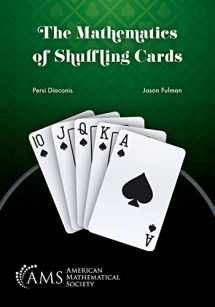
The Mathematics of Shuffling Cards
Book details
Summary
Description
This book gives a lively development of the mathematics needed to answer the question, ``How many times should a deck of cards be shuffled to mix it up?'' The shuffles studied are the usual ones that real people use: riffle, overhand, and smooshing cards around on the table. The mathematics ranges from probability (Markov chains) to combinatorics (symmetric function theory) to algebra (Hopf algebras). There are applications to magic tricks and gambling along with a careful comparison of the mathematics to the results of real people shuffling real cards. The book explores links between shuffling and higher mathematics--Lie theory, algebraic topology, the geometry of hyperplane arrangements, stochastic calculus, number theory, and more. It offers a useful springboard for seeing how probability theory is applied and leads to many corners of advanced mathematics. The book can serve as a text for an upper division course in mathematics, statistics, or computer science departments and will be appreciated by graduate students and researchers in mathematics, statistics, and computer science, as well as magicians and people with a strong background in mathematics who are interested in games that use playing cards.


We would LOVE it if you could help us and other readers by reviewing the book
Book review



